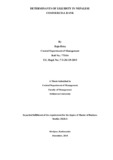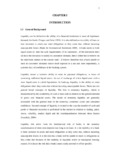Please use this identifier to cite or link to this item:
https://elibrary.tucl.edu.np/handle/123456789/1106| Title: | Effect of Demographics Factors on Risk Tolerance Level of dual Investor Within Kathmandu Valley |
| Authors: | Bhattrai, Mamta |
| Keywords: | Effect;Tolerance |
| Issue Date: | 2018 |
| Publisher: | Central Department of Management |
| Abstract: | Risk tolerance is a crucial factor that influences a wide range of financial decisions. Risk tolerance is defined as an individual willingness to engage in a financial activity whose outcome is uncertain. However, their demographic characteristics drive their risk attitudes. There are various factors which effect the financial decision making of an individual of which demographic variables like age, gender, marital status, education, occupation and income level are the most important one. The study aims to explore the influence and relationship of demographic factors on risk tolerance level of individual investors within Kathmandu Valley. Descriptive research design is used for the analysis of the study. The samples of 120 retail investors have taken from 6 different brokers’ firms as per a convenience of researcher. The structured questionnaire having single and multiple choices along with ranking and likert questions has been used for data collection. The collected data has analyzed through the use of different statistical tool like frequency, percentage analysis, cross tabulation, chi-square and correlation. The study reveals that age, education level, occupation, marital status and annual income have significant effect except gender on individual investors risk tolerance level. There has been a positive correlation between investor’s academic qualification, income level, occupation, marital status with their level of risk tolerance, but investor’s gender & age showed slight negative correlation. As compared to male female investor is more risk taker. Similarly, married are more risk tolerated as compared to single. Older investors are reluctant to take more risk because they may feel that future losses may affect their financial well beings in the retirement period. Finally, the study identifies the need of awareness among potential female investors to attract this lucratic stock market. Likewise, different stakeholders of stock market like SEBON, NEPSE, brokers’ firm and even government should be aware on demographics factors to attract large volume of general investors in Nepalese stock market. |
| URI: | http://elibrary.tucl.edu.np/handle/123456789/1106 |
| Appears in Collections: | Finance |
Files in This Item:
| File | Description | Size | Format | |
|---|---|---|---|---|
| Cover Page(5).pdf | 28.51 kB | Adobe PDF |  View/Open | |
| chapter(1).pdf | 235.98 kB | Adobe PDF |  View/Open |
Items in DSpace are protected by copyright, with all rights reserved, unless otherwise indicated.
